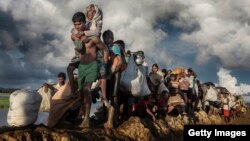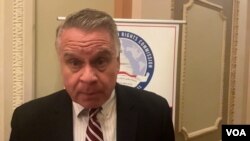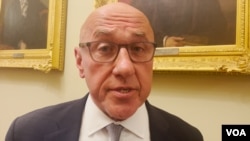U.S. lawmakers from both major parties have voiced their resolve to rally international pressure for an end to the suffering of the people of Myanmar at the hands of the military junta that cut off democratic rule in the country in February 2021.
"We are rededicating ourselves to human rights and peace for the people of Burma," said Representative Chris Smith, a Republican and the co-chair of the Tom Lantos Human Rights Commission, following a hearing on human rights in Myanmar this week.
"We need to do much more for the people who are suffering so horrifically at the hands of a barbaric regime," Smith told VOA. He called for renewed efforts "to stop the weapons from flowing," whether it be from India, China or Russia, and said there needs to be "a more aggressive embargo, particularly on oil, which is a source of great revenue for the junta."
Representative Ilhan Omar, a Democrat, said members of the committee "want to make sure that the genocide that was experienced by the Rohingya and everything that has gone on in Myanmar will not be forgotten — that we keep it in the forefront here in Congress."
Omar told VOA the hearing had served to make sure that the world is working together to "care about the people of Myanmar, try to provide humanitarian aid, make sure that there is a civilian government, but also not forget the displaced, and the internally displaced people and refugees, as we try to think about humanitarian aid."
Democratic Representative James P. McGovern, a long-standing advocate for human rights, is co-chair of the Lantos commission, which according to its website "is charged with promoting, defending and advocating for international human rights as enshrined in the Universal Declaration of Human Rights and other relevant human rights instruments."
McGovern said in his opening remarks that the primary question for the commission is whether Congress, the Biden administration and the international community "are doing all that we can to be wind at the backs of those fighting for human rights and to restore democracy in Burma."
He said the hearing was also an opportunity to review the effectiveness of the Burma Unified through Rigorous Military Accountability (BURMA) Act, which was signed into law in December 2022. It contains a number of economic and diplomatic measures to bring pressure for a restoration of democracy in Myanmar.
"Its implementation is underway," McGovern said, "so today's discussion is an opportunity to take stock of what has been done and ask: What has been achieved, how do we know if we're making progress and what more can we do?"
Testimony
U.S. State Department officials who testified at the hearing detailed the government's efforts to exert economic and political pressure on the junta while highlighting support for humanitarian assistance, including for Rohingya refugees in neighboring Bangladesh.
U.N. Special Rapporteur Tom Andrews, a witness at the hearing and a former U.S. congressman, called for the United States to intensify sanctions against the military rulers, targeting their primary revenue source: oil and gas sales.
"We need to have more sanctions imposed," Andrews said. "I urge the U.S. to join the European Union and immediately impose sanctions on the junta's single largest source of revenue, the Myanmar Oil and Gas Enterprise."
The company, also known as MOGE, is estimated to generate $1.5 billion in annual revenue, about half of the country's foreign currency earnings.
"If you can stop the money, you can cut their ability to continue these atrocities," he said, referring to civilian deaths at the hands of the military.
In a post-hearing interview with VOA, Andrews said he was encouraged by the hearing. "The fact that the United States Congress is asking these questions of the administration is a very positive sign," he said.
Lucky Karim, a prominent Rohingya human rights activist, also testified at the hearing, bringing attention to the plight of the Rohingya community and the need for a sustained commitment by the U.S. and the international community.
"We want more participation from the U.S., the United Nations, Bangladesh and influential countries which care about human rights," Karim said.
Editor's note: An earlier version of this story incorrectly rendered Lucky Karim's name. VOA regrets the error.









